London Film Festival 2018, Report 4: Haunted Dresses & Horrors Of The Past
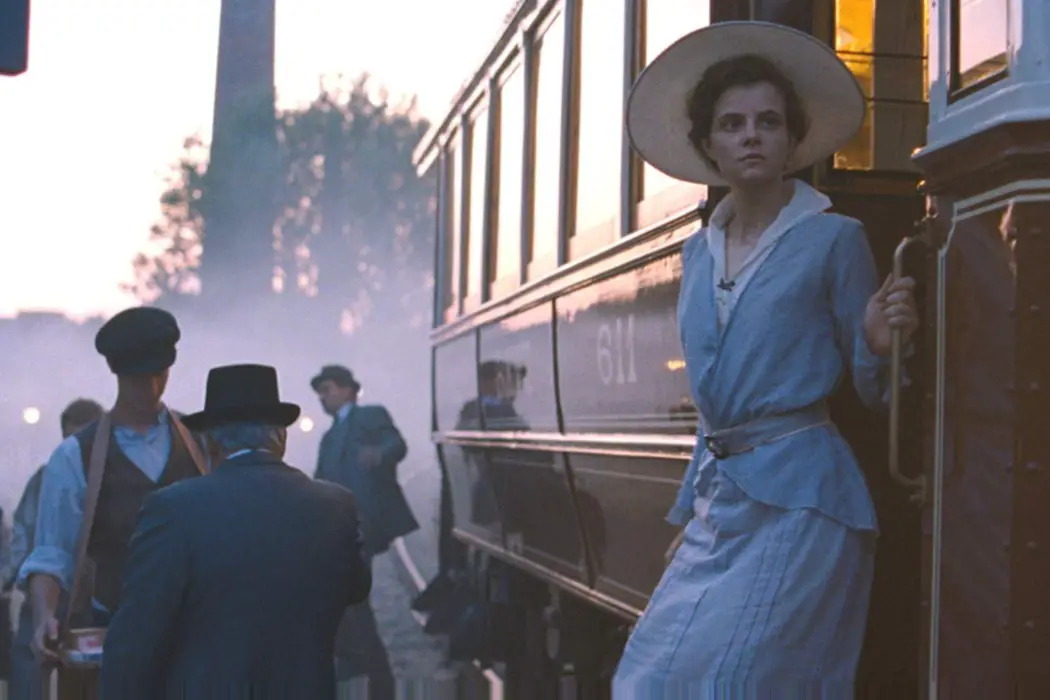
Alistair is a 25 year old writer based in Cambridge.…
By the time you read this, the 2018 edition of the BFI London Film Festival will be over. But with the Film Inquiry team having seen more films than they’ve had the time to write about over the past couple of weeks, this won’t be the last you’ll be hearing us this year.
Eagle eyed readers may notice that two of the films we promised capsule reviews for last week (Peter Jackson‘s They Shall Not Grow Old and S. Craig Zahler‘s Dragged Across Concrete) aren’t to be found here – but there will be full, in-depth reviews fresh from LFF making their way onto Film Inquiry very soon. In their place, this week we have a nice mix of crowd pleasers in-waiting, anticipated auteur efforts, and a slew of arthouse discoveries.
Green Book (Peter Farrelly)
Nathan Osborne: Screened at the Festival as this year’s Surprise Film, Peter Farrelly’s Green Book is perhaps the most crowd-pleasing, heartwarming film to be found in this year’s line-up. A completely charming, loveable journey that superbly balances a breezy humour with more weighty theme work, it is the biggest surprise of this year’s festival thus far – and not just because we didn’t know what it was going to be.
Farrelly and Brian Hayes Currie co-write the script with Nick Vallelonga – the real-life son of one of the two protagonists – who help enrich the script by supplying the letters sent by his father, Tony Lip Vallelonga. It clearly adds authenticity to this true-life story and it helps craft a more genuine experience. In one breath laugh-out-loud hilarious and in the next emotionally poignant, Green Book handles the difficult subject matter with sensitivity, carrying so much heart through every minute of the (literal and metaphorical) journey. You will be hard pressed not to be swept up in this delightful tale.
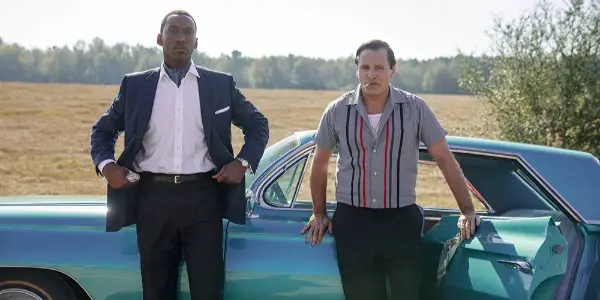
With two stellar performances at its heart, Viggo Mortensen and Mahershala Ali form a complex and compelling dynamic that delves into perception and understanding with genuine empathy; it’s a case of two polar opposites coming to reconcile their difference – it’s far from the most inventive thing narratively but it is so superbly executed that you can easily overlook how closely it sticks to the wider formula. Every now and then, the tonal whiplash can become too jarring and its treatment of racism is disappointingly shallow, but – and in no way trying to excuse it for these flaws – it’s well-meaning. It seeks to emphasise the unbelievable hypocrisies of the era but seems reluctant to condemn Tony for a similar outlook not too earlier in the narrative.
Still, with Mortensen delivering a sharp, transformative turn and Ali bringing a real nuance and careful consideration to his performance as Don Shirley, their characters are more layered individuals with flaws, secrets and agency of their own. In spite of its minor issues, Green Book is a rich, entertaining and frequently powerful piece bound to be embraced by audiences when its release comes. A real, unexpected triumph.
In Fabric (Peter Strickland)
Gus Edgar-Chan: Peter Strickland is a walking contradiction. He’s a man whose filmography runs on woozy pastiche, yet manages to feel wholly singular. In that regard, at least, In Fabric is no different. It’s a fetishistic fable following the unfortunate possessors of a sanguine dress, purchased at a retail store that serves as a front for a menacing coven. Choppily-edited newspaper clippings crowd the screen, sound design is cranked up to high heaven, and two bald witches go at it with a dolled-up mannequin. There’s no separating this dreamland from the Strickland, even if the Giallo references are as plain as day and as atmospheric as night.
As he dons the dress, he sheds the sincerity that had kept his work afloat – or in The Duke of Burgundy’s case, had manufactured a moth-mad masterpiece. His latest is a screwy comedy that makes the catastrophic blunder of acknowledging its own parody. His films only function when the overt stylisation is taken seriously. Here, any phantasmagoric flourish is served with a wince and an apology. The illusion dissipates.
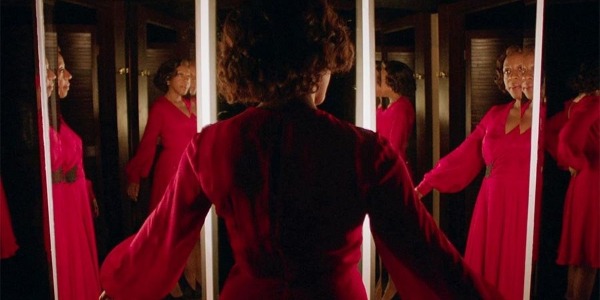
As such, it’s much easier to notice that the bipartite plot is as thin as the dress’ regenerating threads. The garment’s unlucky proprietors are a recently-divorced mother (Marianne Jean-Baptiste), an airhead repairman, (Leo Bill) and his unfettered wife (Hayley Squires). Their demises are relayed to us in two stories – perhaps this is the worst number for an anthological film. One gives us a tale with fully-developed characters, stakes, and breathing room. Three gives us variety. At two, we’re stuck in the ugly, unsatisfying middle.
It leaves style as the only sustenance. In Fabric has bags of it, but it’s hardly meaningful when there’s little in the way of thematic juiciness. The film takes a stab at saying something in its final, ‘too-little-too-late’ moments, fleshing out a heftier ode to the British independent retail store (and condemning the effects of capitalism), but this arrives in the form of a correction-course footnote rather than emerging as an unnoticed ghost strand.
The two stories also draw attention to how quickly its director exhausts his trickbook. The humour, extracted directly from the style, inevitably follows suit. Self-destructing washing machines, overly-verbose dialogue, love vouchers and investigative role-play all fall victim to overuse. The term ‘too much of a good thing’ isn’t necessarily a condemnation, but as far as In Fabric is concerned, it’s devastating. The witches can’t weave their magic: Strickland doesn’t fit the dress.
Journey to a Mother’s Room (Celia Rico Clavellino)
Chloe Walker: Estrella (Lola Dueñas) and her grown daughter Leonor (Anna Castillo) live together in a small house in rural Spain. Whilst they are very close, Leonor is eager to leave the nest and find an au pair job in London. Journey To A Mother’s Room charts how this decision and subsequent absence changes life for both mother and daughter.
Journey To A Mother’s Room may be the debut feature from Spanish director Celia Rico Clavellino, but it is shot with the nuance of an established master. Her film takes place almost entirely within the house of Estrella and Leonor, and features little action. There’s not even all that much dialogue. Within these confines, Clavellino weaves whole worlds of history and emotion.
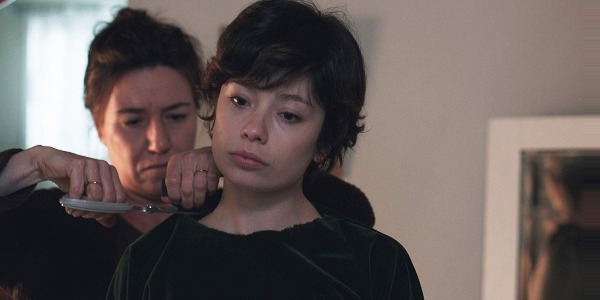
She’s helped by her lead actresses. Lola Dueñas has always been a warm presence on screen (look at any of her work with Almodóvar), and Anna Castillo won plenty of praise for her revelatory performance in 2016’s The Olive Tree. So much more here is said in shared looks and touches than it is in words. From the first time we see them curled up asleep together on the sofa, to their last shared embrace, their closeness is always convincing.
When they are apart, you witness the wrench of that separation. We stay in the house with Estrella as she navigates this new life alone. Her husband has recently died, though his death is never openly discussed; it’s a constant feeling colouring the edges of the movie. As she putters through her life, just getting on with things, we see her gradually growing stronger. It’s a small, almost imperceptible growth, but it’s so rewarding to watch. By the time she and Leonor are reunited, not much has actually happened, yet it still feels as if we’ve been on a real emotional journey.
Ladyworld (Amanda Kramer)
Andrew Winter: And the award for the year’s most unsettling movie score goes to… Callie Ryan for Ladyworld. If Amanda Kramer’s debut feature wasn’t already discomfiting enough, Ryan’s accompanying music pushes it right over the edge. A hellish symphony of nursery-rhyme breaths, squeaks, meows and stabs, the score dominates proceedings here, and the film wouldn’t be nearly as effective without it.
Kramer’s psychological thriller sees a group of teenage girls trapped in a house after an earthquake disrupts the birthday party being thrown for their friend Eden (Athena Frizzell). Not all of the young women – Olivia (Ariela Barer), Piper (Annalise Basso) and Dolly (Ryan Simpkins) among them – know each other, and it isn’t long before tensions build, especially because the quake has knocked out electricity and water. Weak with hunger and thirst, tired and scared, they start to turn on each other.
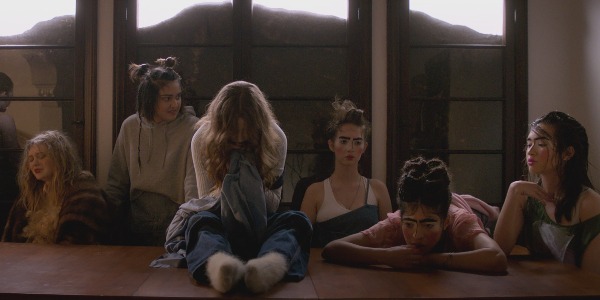
Luis Bunuel’s The Exterminating Angel seems a likely reference point for Kramer. In that film, well-heeled members of the Spanish bourgeoisie found they couldn’t escape a dinner party despite no obvious barrier to the outside world. I suspect something similar is going on here and that the ‘earthquake’ might even have been a figment of their collective psyche. These are young women on the verge of adulthood and that transition is terrifying for them. Ladyworld presents coming of age not as something to be celebrated but to be denied and hidden away from. Dolly hangs on to her antique doll for dear life – perhaps the last vestige of childhood.
Kramer makes excellent use of the enclosed space with slow-moving tracking shots to increase the paranoia and claustrophobia, while artfully-composed tableaux – as if the girls were posing for a photograph or painting – underline that everything might not be as it seems. There is unanimity and collectiveness in these moments – the director suggesting the women’s only chance in a tricky situation is to stick together and support each other. No drama in that though.
Basso is the stand-out performer but then her character is the most complex and fascinating. Piper and several other girls split off into their own gang, which she runs like a flame-haired Colonel Kurtz, going on to wage psychological warfare against Olivia and Dolly. Ladyworld builds to a hysterical fever pitch in its final act, the cherry on top of a confident, impressive debut.
Non Fiction (Olivier Assayas)
Alistair Ryder: If there’s one easily digestible common theme that unites Olivier Assayas’ work, from understated family dramas like Summer Hours to experimentations with genre like his previous masterwork Personal Shopper, it’s his thematic obsessions with the changing face of technology and how this affects the ways in which we communicate and consume art. For the opening half hour, Non-Fiction articulates the director’s ever-evolving thesis on these subjects with such unrelenting focus, it can often feel like he’s put transcripts of his own interviews into the mouths of the characters onscreen.
But as interesting as it is to hear debates on the consumption of literature in the Kindle era, where attention spans have decreased due to the rise of blogs and social media posts, it does prove to be an ineffective start, failing to properly prepare for the character comedy that follows. Assayas slowly integrates these themes effectively into the storytelling to such an extent, the decision to open with extensive debates on these very issues slightly undermines the thematic strength of his deceptively slight comedy.
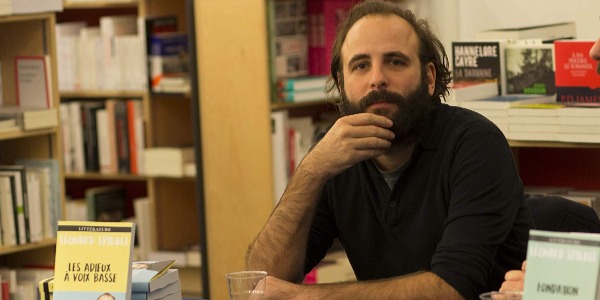
Hotshot literary editor Alain (Guillaume Canet) has a longstanding relationship with author Léonard (Vincent Macaigne), but initially refuses to publish his latest novel – a thinly disguised work of “auto-fiction”, where he accidentally confesses to cheating on his partner via a character named after himself. What Alain doesn’t know is that the inspiration for the woman in the book in question is his own wife, Selena (Juliette Binoche), who agrees to help Léonard get the book published despite being considerably irritated at some of the details he’s changed for artistic effect. Soon, Léonard heads out on a publicity tour, and finds himself the subject of online controversy, and being incessantly asked about one segment of the book dedicated to describing receiving a blowjob in the cinema during a film that, without spoiling anything, is fairly unsexy to say the least.
Macaigne’s supporting performance is what makes Non-Fiction such a surprisingly effective comedy. In Léonard, Assayas has created the perfect vessel with which to extrapolate his views on modern literature, while offering broad laughs throughout. From bookshop Q&A’s to cringe inducing radio interviews, where the hosts seem more interested in getting him to describe the harrowing plot of the film central to his book’s blowjob sequence over the novel itself, Assayas thrives on throwing the character into awkward situations. Thanks to Macaigne’s perfectly pitched performance, it’s some of the funniest work he’s ever produced – an arthouse treatise on the role of literature in the modern world that packs a broader comic punch than I could have previously imagined.
Assayas is one of the few directors who refuses to repeat himself – and although this may be the first of his films to feel somewhat familiar to his prior work due to the overt nature of its thematic discussions, the slow progression towards bumbling character comedy shows that he’s still breaking new ground for himself in his comparatively minor efforts.
Peterloo (Mike Leigh)
Matthew Singleton: The story of the Peterloo massacre of 1819 deserves to be shared. It deserves to be heard, and quite frankly, it has been lost under the mud of the tragedies that have befallen Britain since. Mike Leigh’s Peterloo, although with some interesting flashes, is a disappointing testament to that most horrific event.
The film builds up to the fateful event over 2 hours, as we see the tensions in and around Manchester rise. The working classes, unhappy with their mistreatment and suffering at the hands of the country’s elite, plan revolution like their French brothers only years before. The government and judges on the other hand contemplate a resolution to the issue, most likely a suppressing of revolutionary thought by any means necessary.
If you think that seems like a simplistic retelling of the Peterloo massacre, then you’d be entirely correct. A huge cast covering all spectrums of society from the working class, to the judges to the King himself are represented. Very few are anything but one dimensional, with many of the northern working-class merely stereotypes, and some of the elite pantomime villains. This half-baked writing mixes poorly with some pretty shocking overdramatic acting in some cases too.
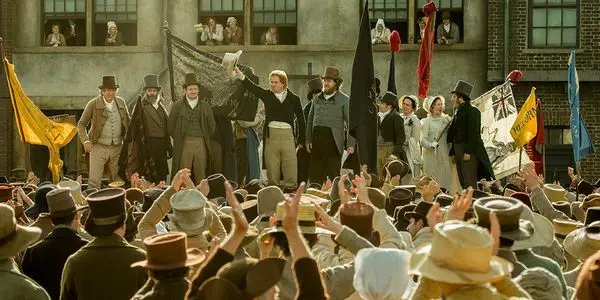
The film finds its feet somewhat when it focuses on a handful of working class families involved in the movement. Maxine Peake and Neil Bell try their hardest to bring some quality to proceedings but they are left out in the cold by the film around them. The cast is simply too large, with many characters and plot threads completely unnecessary. So many characters slip in and out of the film, disappearing for large chunks of time. Therefore despite the two and a half hour runtime, you’d be hard pressed to find any distinctive characteristics for any of the family members beyond poor and working class.
Its long runtime is completely undeserved too, with the first hour comprised of speech after speech, and lots of people sitting around discussing letter after letter. Audiences are bound to find this tedious especially as the film barely moves forward in this time at all.
There are bizarre decisions abound in the film, from the plot elements introduced late on and never resolved, to the abundance of uninteresting and disposable characters, and the less said about some of the acting the better. However it is the flatness of the film that hurts most of all. There is no life and no urgency to the film. It ultimately feels static and stale. This is bitterly disappointing considering the subject matter is such a crucial, radical and urgent moment in British history. Peterloo, perhaps most surprisingly, leaves you feeling very little at all.
Sunset (Laszlo Nemes)
Charlie Nicholson: With Sunset comes confirmation of director Laszlo Nemes’ distinctive authorial style. Carrying over the insular perspective and matter of fact delivery of his impressively raw Son of Saul, this sophomore feature observes with similar intimacy the class relations and political tensions of pre-First-War Budapest, allowing the director to tease the facade of pleasant gentility dolling the surface of the Hungarian Belle Epoque in pursuit of a much darker, monstrous truth.
Yet, the elusive central mystery finds itself invariably dependent upon withholding information, producing a languid set of musings that leave the marvellously displayed paranoia of its protagonist firmly out of reach.
Our vision of early 20th Century Hungary comes through the perspective of Irisz Leiter; the young daughter of the deceased Leiter family, who has travelled to Budapest to work as a milliner at her parents’ hatmakers, which is now run by businessman, Oszkar Brill (Vlad Ivanov), following their death in a mysterious fire.
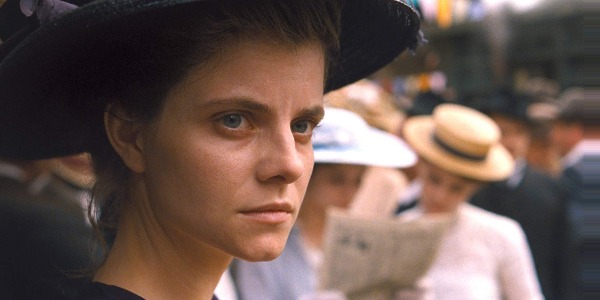
Having grown up in Vienna with no memory of her parents, Irisz wishes to know more of her family, which leads her to discover she’s a brother she’s never been told about. What’s more, there’s an anxious silence surrounding the Leiter son, and rumour has it he’s murdered, and now runs an organised resistance against the Viennese aristocracy.
Through that chokingly pulled-in camera style that gave Saul its bite, we follow Irisz by the nape of her neck as she peers between door cracks and loses herself in the swathes of creams and pale blues that – in another film – might’ve reflected nothing but a purely idyllic 20th Century Hungary. Here, every retracted breath is audible as the protagonist paws at something truly abhorrent: Brill’s reticent exchanges with patrons suggest a bizarre ritual that involves sending choice Leiter milliners to work as ‘chosen’ servants to an esoteric society of aristocrats, only to disappear to make way for others. The suggestion is frightening, and one made all the more disquieting by the communally-agreed vow of ignorance that appears to be keeping the capital alive (“There’s nothing to see!” the eminent Brill exclaims).
But Sunset’s continual nudging begins to frustrate, not least because it prevents the viewer sustaining the intimate connection its engrossing style seems to strive to create. It’s a plodding display of hesitance and narrative side-steps, at once so insistent upon illuminating the beast beneath beauty, yet so quick to lurch back into the dark before the monster has a chance to impact.
Suspiria (Luca Guadagnino)
Andrew Winter: Dario Argento’s horror classic Suspiria came in at a pacy 98 minutes, featured a Goblin score bombastic enough to give Richard Wagner a headache, and a colour palette so red it could’ve stood as leader of the communist party and won by a landslide. The film was a hysterical heavy-metal head-punch that turned it up to 11 in the opening minutes and only got louder and more deranged from there.
When adapting Argento and Daria Nicolodi’s screenplay for this remake, Call Me By Your Name director Luca Guadagnino decided to create something very different to the original. So, its running time is an eye-watering 152 minutes, its pace glacial, colour scheme muted, and Thom Yorke’s music pretty but unmemorable. The main difference between the two films, though, is that the new one simply isn’t very good.
It’s the 1970s, the Cold War is raging and Susie Bannion (Dakota Johnson), a young American dancer, has just enrolled at West Berlin’s prestigious Markos academy, which is run by Madame Blanc (Tilda Swinton). One of the academy’s students – Patricia (Chloë Grace Moretz) – has recently gone missing with rumours suggesting she has joined the Baader-Meinhof group. Odd then that we’ve already seen her telling psychotherapist Dr. Josef Klemperer (also Swinton) that the academy is cover for a coven of witches and she’s their intended next victim.
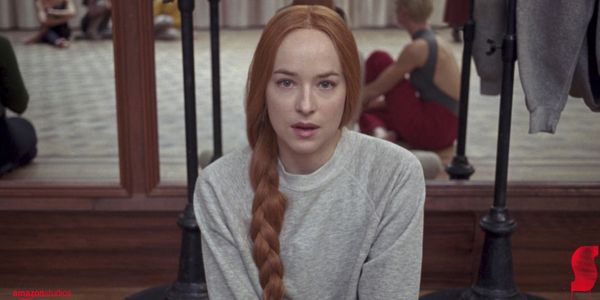
The film’s deliberate pace and the fact it gives away the original’s big twist in the first few minutes means there is little sense of urgency or mystery. But at least Guadagnino grapples with some weighty themes, using Klemperer to personify Germany’s post-WWII guilt and shame, while drawing parallels between the cultish nature of the coven, the terrorist group, and Bannion’s strict religious upbringing.
Swinton’s Blanc certainly has something of the night about her but – other than looking icy and enigmatic – doesn’t have much to do. Lucky, then, the actress gets to additionally play two other characters – both under heavy make-up – including Klemperer. This is the second time Swinton has taken on multiple roles in the same movie, although far more challenging than her turn as twins in Hail, Caesar!
Suspiria’s stand-out moments include the witches’ hilarious humiliation of two ensorcelled cops and a couple of solid horror sequences. One of them – a blood-drenched showdown featuring practically the whole cast – is perhaps the only time Guadagnino’s film matches the original’s sturm und drang.
The White Crow (Ralph Fiennes)
Charlie Nicholson: Ralph Fiennes’ third feature, The White Crow, is titled after the disparaging nickname given to Rudolf Nureyev, the boy “born on a train” just outside Siberia. Those familiar with the dubbed ‘Lord of the Dance’ will know that the outsider status would eventually become a celebrated part of the defiant genius of one of ballet’s most celebrated dancers – and it’s a celebration that Fiennes dedicates every frame of his (admittedly rather railed) biopic to affirming.
Oleg Ivenko plays a winningly childlike Nureyev as he defects to the West, having reached the big time as Leningrad’s finest dancer. Arriving on tour with the Kirov Theatre in Paris, 1961, the young ‘Rudi’ continually drops his Russian cohort to schmooze with locals, explore French culture, and take issue with the direction given him by the hosting academy.
The structure is predominantly a coming-of-age one, observing the artist’s enduring curiosity and smirking iconoclasm with a playful passion. Credit is more than due Ivenko for bringing David Hare’s lacking screenplay to life – though sometimes the overwrought silences and skewiff jokes jangle behind even his winningly blunt delivery. There’s a wonderful adage concerning the dancer’s childhood fascination with trains; we see him throw a tantrum in the local toymaker’s over the lack of quality railway models, and watching him hunch over on his bedroom floor to watch the completed model whirl around a simplistic track casts an endearingly innocent image of the famed dancer that one can’t help but get a little gooey over.
But between these boyish comedic spouts come musing panning shots that follow Nureyev scanning the male nudes of The Louvre, and attempting to distill their inscrutable power into his performance in gruelling (though here, always supremely good-looking) training montages. It’s overtly spiritual and predominantly optimistic, often to a fault as such time is spent revelling in the dancer’s commitment to his craft, that the psychological strain he endured during his defection never receives much more than a passing glance.
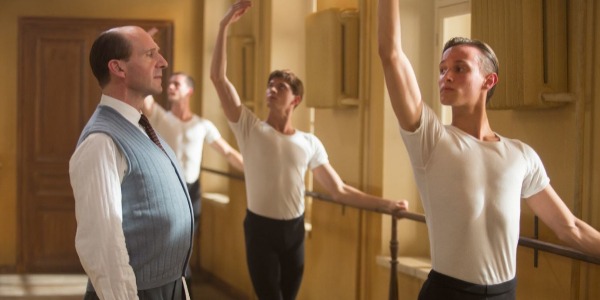
Ivenko’s Rudi glimpses the dancer’s insecurities around class (“I play princes, but I am not [a] prince!”), and his political tensions with the Russian government begin to arise in a climactic scene that should contain more urgency. We even begin to point toward an encouragingly supportive view of the Russian ballet community, which against an action landscape chocked with antagonised Russians is truly a lovely change.
But the interior anxieties that racked Nureyev both during, and concerning his defection are realised too close to finishing, which leaves the viewer not disappointed, but confused as to how something so earnestly respectful could feel this lifeless.
It’s plain to see that The White Crow is an ode to the imperfect heart of art. Fiennes certainly understands the tireless dedication required to create true art, and his respect for the dancer’s maverick existence during a time of liberal intolerance shines ardently behind a sparse script and baggy lingering shots. But just as Rudi’s determination to pursuing ‘art’ begins to eclipse his life, so too does The White Crow’s interest in appraising the artist end up eclipsing the man. Though commanding appreciation of the immense solidarity of the Russian ballet community, one does leave wishing one had known Rudi a little better.
Our LFF coverage isn’t wrapping up yet! Our next piece will feature our takes on A Private War, the narrative debut from the acclaimed director of Cartel Land, as well as this year’s closing film, Stan and Ollie.
Does content like this matter to you?
Become a Member and support film journalism. Unlock access to all of Film Inquiry`s great articles. Join a community of like-minded readers who are passionate about cinema - get access to our private members Network, give back to independent filmmakers, and more.
Alistair is a 25 year old writer based in Cambridge. He has been writing about film since the start of 2014, and in addition to Film Inquiry, regularly contributes to Gay Essential and The Digital Fix, with additional bylines in Film Stories, the BFI and Vague Visages. Because of his work for Film Inquiry, he is a recognised member of GALECA, the Gay & Lesbian Entertainment Critics' Association.













